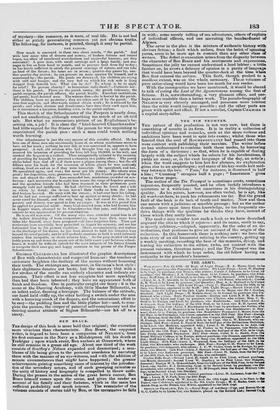BEN BRACE.
THE design of this book is more bold than original; the execution more vivacious than characteristic. Ben Brace, the supposed writer, is feigned to have been a companion of NELSON'S, from his first entrance in the Navy as a Midshipman till his death at Trafalgar ; upon which event, Ben anchors at Greenwich, where he still remains in a green old age. About one third of the work consists of Southey's Nelson expanded and dramatized; a sem- blance of life being given to the personal anecdotes by narrating them with the manner of an eye-witness, and a ith the addition of minute circumstances that might have happened; the greater achievements gaining something more of interest by the introduc- tion of the secondary actors, and of such gossiping minutia+ as the unity of history and biography is compelled to throw aside. During the pauses in the action of the great hero's career, Ben Brace himself comes upon the scene, and gives the reader an account of his family and their fortunes, which in the main has sufficient probability and much interest. The remainder of the volumes consists of stories told by Ben, or the messtuates befalls
in with ; some merely telling of sea adventures, others of exploits of individual officers, and one narrating the bombardment of Algiers.
The error in the plan is the mixture of authentic history with obvious fiction; a fault which sailors, from the habit of apinniag yarns, seem to be more apt to commit than any other class of writers. The defect in execution arises from the disparity between the character of Ben Brace and his sentiments and expressions. Sometimes the jolly tar cannot understand a land lubber ; a little further on, he avows a delicacy of opinion in a purity of language that would have been beyond the quarter-deck at the time when Ben first entered the service. This fault, though pushed to a needless extent, was on the whole necessary. nice volumes of pure sailor-slang would have been too much for any reader. With the incongruities we have mentioned, it would be absurd to talk of rating the Last of the Agamemnons among the first of fictions. It is, notwithstanding, a very pleasant affair, and per- haps more readable than a better work. The pseudo-biography of NELSON is very cleverly managed, and possesses more interest than the critic would imagine possible ; and the other parts are given with spirit and effect. If not a novelist, Captain CHastuta is a capital story-teller.


























 Previous page
Previous page